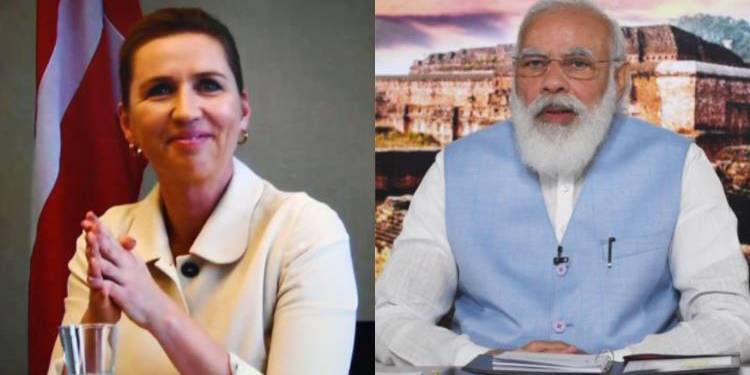Denmark joins the general trend of European Union’s pivot away from China and the virtual summit between PM Modi and PM Mette Frederiksen (the leaders of New Delhi & Copenhagen respectively) has cleared all and any doubt about the trend. The summit was significant in many ways as it was the first virtual summit with a European country. It lasted for an hour, where many significant points were discussed and agreed on.
Briefing journalists, joint secretary Neeta Bhushan said, “This was a new age partnership and will add a new dimension to our bilateral relations. This will help expand economic relations and green growth, and strengthen cooperation on addressing global challenges; with a focus on the implementation of the Paris Agreement and the climate change goals.”
Both India and Denmark have a strong linkage of economic and trade relations with Denmark investing more than 1 Billion USD in India during the first 18 years of the 21st century through direct and listed companies. Major Danish companies like Novo-Nordisk, A.P. Moller Maersk, Vestas, etc., employ over 100,000 people in India. Similarly, major Indian IT companies such as Tata Consultancy Services (TCS), L&T Infotech, Infosys Technologies, ITC Infotech, Mahindra Satyam and Ubique Systems have investments in Denmark.
PM Modi said during the summit, “COVID-19 has shown that it is risky to rely excessively on any single source of global supply chains. We are working together with Japan and Australia for supply-chain diversification and resilience. Other like-minded countries can also join the efforts.”
He also added, “The events of past few months have made it clear that how important it is for the like-minded countries, who share rule-based, transparent, humanitarian and democratic value-system, to work together.”
It was a very clear declaration that India is going all out to nudge like-minded countries to come together with the QUAD and diversify the global supply chain so that in case of any drastic downturn in the international relations, these countries don’t find themselves forced to toe the Communist Party of China’s line.
The intent of kicking away Chinese dominance in the global supply chain was earlier reported by TFI. In the backdrop of China’s aggressive political and military posturing, India, Japan and Australia are jointly countering the Chinese challenge as the troika has started deliberations to launch a trilateral Supply Chain Resilience Initiative (SCRI) to reduce the dependency on China.” It will not be poetic to say that India under PM Narendra Modi is leading the fight against China to liberate the world from its dependence on the Communist regime at Beijing.
The two leaders also agreed to elevate their relationship to Green Strategic Partnership and reaffirmed their determination to strengthen cooperation and contribute to the comprehensive reforms of the WTO. As per the joint statement, “Both countries have very ambitious national targets on climate and energy that will contribute to an ambitious implementation of the Paris Agreement. Together, the two countries will show the world that delivering on ambitious climate and sustainable energy goals are possible.”
With the combined emphasis on global supply chains, cooperating in issues of climate change, supporting and promoting rule-based multilateral systems as well as supporting the reform of World Trade Organization (WTO), it was the most scathing attack on Chinese attempt to hijack the World Liberal Order in the form of a bilateral joint statement.
The efforts by EAM S Jaishankar are starting to pay dividends in Europe compared to which the Chinese Foreign Minister’s Europe tour was an abysmal disaster. This can be termed as another diplomatic win in the face of an aggressive and out of control China.

























